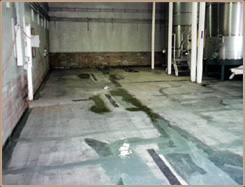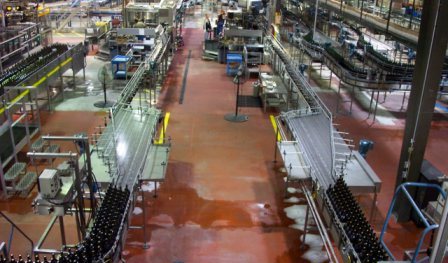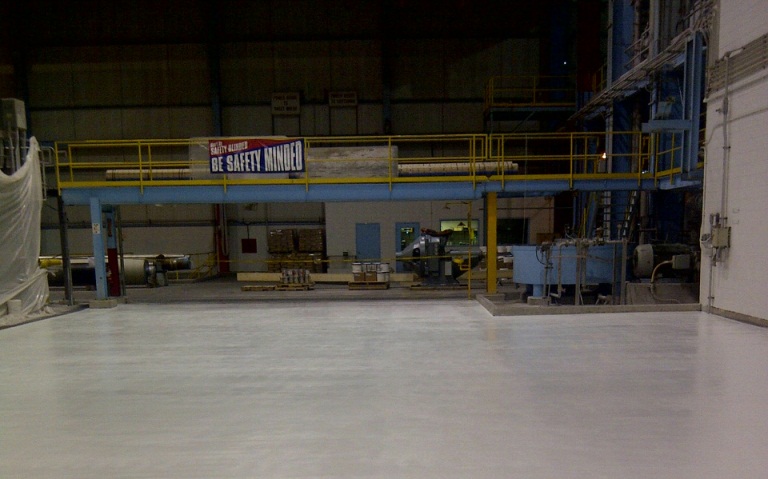Chip Miller and his crew from Southland Coating Technologies are regularly called out to the largest poultry processing plant in Arkansas to complete quick turnaround coatings jobs. And they are always absolutely certain that they are up to the task. How can they be so confident that they can finish the job on schedule? Read on to learn how the crew’s knowledge of the proper cleaning and surface preparation procedures, as well as the application of an innovative 100 percent solids epoxy coating system, solves all the challenges of one particular project that was up against the clock.
Temperature Rising
Southland Coating Technologies is a nationwide coatings contractor with full-service offices in Phoenix, Ariz., and Russellville, Ark. According to Miller, he and his crew are no strangers to performing work at this processing plant, which chooses to remain unnamed. “We do the majority of the floor coatings work for the poultry facility. Many weekends, we come in and apply coatings throughout the freezer, production, and processing rooms,” said Miller. For these jobs, ChemProof Polymers’ PermaTec 3000 is the only material Southland uses. In fact, ChemProof Polymers is one of only two industrial flooring manufacturers whose products are permitted in the facility. “The PermaTec 3000 coating system has all the strength properties and durability of a 100 percent solids epoxy and has a similar thermal coefficient — the ability to expand and contract in extreme temperatures — to cementious urethane. Because of this, the PermaTec 3000 has changed the way we install coatings throughout the country. We’ve never seen another product like it. It sure has made our lives easier,” said Miller.
To illustrate just how the expertise of the Southland crew and the properties of PermaTec 3000 are a great match for the floors of the poultry processing plant, Miller offered up the coating of a 2,800-square-foot (260 m²) chiller room as an example. The concrete in this particular room was in very poor condition, with the substrate saturated with animal fat and the top layer of concrete “cream” completely gone in some areas. “There were even areas where the concrete was worn down to exposed aggregate,” said Miller. To get things moving, the crew first needed to raise the temperature.
In the food and beverage industry, time is everything. To minimize downtime, most jobs are done during the weekends. This meant that the Southland team had about 36 hours to complete everything from cleaning and prep to the application of the final layer of coating. However, while the crew needed to move quickly and efficiently, there is one thing that couldn’t be rushed: the warming of the freezer room. “Before we could start the prep and repair work, we requested that the plant owners start increasing the room’s temperature using the plant’s internal chilling system,” said Miller. By increasing the room’s temperature gradually, the substrate temperature rises to above freezing, while the formation of condensation is minimized, as is any concrete movement. According to Miller, they’ll use the same process in reverse at the end of the job: they’ll drop the room back to its normal operating temperature of 32° F (0° C) once the coating has cured.
In Rough Shape
 Once the temperature in the chiller room was sufficiently raised, the crew was ready to begin the cleaning and surface prep process. First, the crew pressure-washed the substrate and then applied a degreaser to get rid of the animal fat and any other grease and debris on the concrete. This process was repeated, and then the crew performed a pH test to ensure the substrate was properly clean. “The coating material is pretty forgiving, so the average pH needs to be between 7 and 11,” said Miller.
Once the temperature in the chiller room was sufficiently raised, the crew was ready to begin the cleaning and surface prep process. First, the crew pressure-washed the substrate and then applied a degreaser to get rid of the animal fat and any other grease and debris on the concrete. This process was repeated, and then the crew performed a pH test to ensure the substrate was properly clean. “The coating material is pretty forgiving, so the average pH needs to be between 7 and 11,” said Miller.
At this point, the substrate needed to be prepared to receive the PermaTec 3000. The crew used SASE SC10E electric scarifiers to grind down the concrete. “We can’t shot blast in this particular facility as shot blasting is not permitted in food processing areas. We used the scarifying equipment to remove loose concrete, open up the concrete to get proper penetration,” said Miller. The crew also used demolition hammers along all perimeters and keyways to cut in termination points.
All prep was done before repair grout or the coating system itself was applied. In areas where the concrete was especially damaged, the crew trowel-applied ChemProof Polymers’ PermaGrout E to repair the substrate and bring it back up to the original grade.
For the prep process, the 10-man crew came in aggressively; they worked 14 to16 hours on the first day. “We had to get all the cleaning and prep done, otherwise we wouldn’t be able to finish on schedule. The second day was the application day, so once the coating was installed, we had some down-time while we waited for the coating to cure,” said Miller.
Ready, Set, Coat
 With the concrete prepped and repaired, it was time for the crew to slurry-apply the ChemProof Polymers PermaTec 3000 CT at a thickness of 3/8 inches (9.5 mm). Using a 16-inch (41 cm) bull-nose trowel, the crew laid the coating down. Then they back-rolled the coating to lay out any trowel marks and broadcast 30/40 silica sand to the point of rejection. “We came back in approximately seven hours later when the coating had cured. We swept up excess aggregate, and at this point, the job was done. The PermaTec 3000 CT is a self-priming material and no seal coat is required,” said Miller. This is one of the reasons why Miller is so enthusiastic about this product — there is no need to transport many different coatings to jobsites; only the body coat and the broadcast material.
With the concrete prepped and repaired, it was time for the crew to slurry-apply the ChemProof Polymers PermaTec 3000 CT at a thickness of 3/8 inches (9.5 mm). Using a 16-inch (41 cm) bull-nose trowel, the crew laid the coating down. Then they back-rolled the coating to lay out any trowel marks and broadcast 30/40 silica sand to the point of rejection. “We came back in approximately seven hours later when the coating had cured. We swept up excess aggregate, and at this point, the job was done. The PermaTec 3000 CT is a self-priming material and no seal coat is required,” said Miller. This is one of the reasons why Miller is so enthusiastic about this product — there is no need to transport many different coatings to jobsites; only the body coat and the broadcast material.
For the duration of the chiller room job, the crew wore standard personal protective equipment (PPE): safety glasses, ear plugs, ear muffs, leather gloves, and steel-toed boots. According to Miller, because the coating system has no odor and no volatile organic compounds (VOC), there was no need for the crew to wear respirators.
A Perfect Match
The food and beverage industry has very specific requirements, and according to Miller and Jeff Glass of ChemProof Polymers, PermaTec 3000 has all the properties necessary for a durable, long-lasting coating system. “The demands we see in the food and beverage industry include minimal downtime during application and coating systems that are odor- and VOC-free and are able to withstand mechanical abrasion and thermal shock from hot water wash downs,” said Glass.
According to Glass, for many years cementitious urethanes were the industry standard as the result of ASTM C531 Thermal Coefficient of Expansion and Contraction. “Ideally, you want a material that expands and contracts similarly to concrete in order to prevent stress cracking in the floor. Concrete typically possesses a value of 1x10-5 in./° F [2x10-5 cm/° C]. Urethane concretes typically range from approximately 1.1–2.2 for busch gardens story, i thought the vendor team was the exact same one for part 1 and 22.2, depending on the manufacturer. Epoxies historically have ranged anywhere from 3.5 and higher. A couple of years ago, we had PermaTec 3000 tested by an independent lab. Our epoxy came in at approximately 1.6,” revealed Glass. So what does that all mean? These test results combined with the tensile strength, abrasion resistance, and quick cure time of PermaTec 3000 make it an excellent choice for food processing facilities.
A Team Effort
The success of the chiller room job, as well as the other projects Southland performs at the poultry plant, is due in no small part to their partnership with ChemProof Polymers. Miller calls Glass and the ChemProof Polymers team “problem solvers” who manufacture “revolutionary products.”
Glass also pointed to the expertise of Miller and his team as a vital component in the successful installation of PermaTec 3000 CT. “I have known [Chip] and done business with him for the past 15 years. I feel that our relationship is one of the most successful long-term supplier/contractor relationships in our industry,” stated Glass. And that’s how problems are solved.
